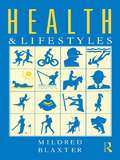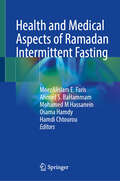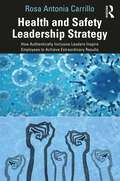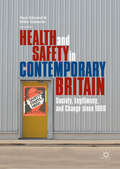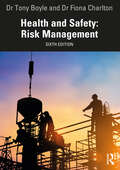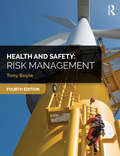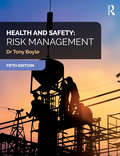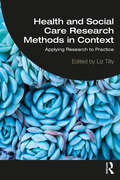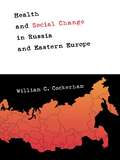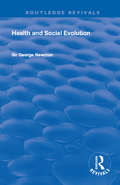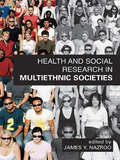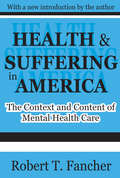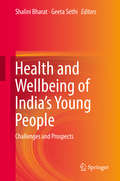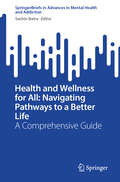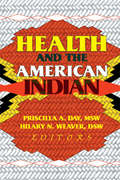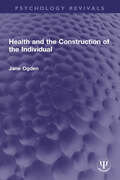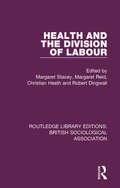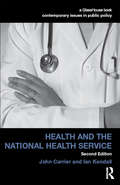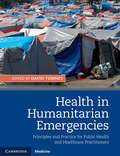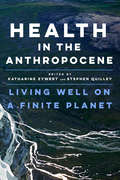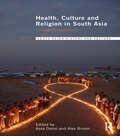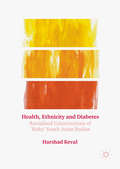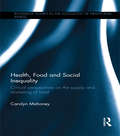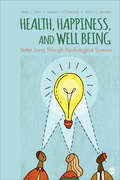- Table View
- List View
Health and Lifestyles
by Mildred BlaxterWhat is a `healthy' lifestyle? Which is more significant: the social circumstances in which people live, or lifestyle habits such as exercise or smoking? Health and Lifestyles is the first description of a large and representative survey of the British population asking just those questions. It examines the findings, and considers issues such as measured fitness, declared health, psychological status, life circumstances, health-related behaviour, attitudes and beliefs. Providing firm evidence of the importance of social circumstances and patterns of health-related behaviour, Health and Lifestyles is an important contribution to current debate, revealing the levels of inequality in health in Britain today.
Health and Medical Aspects of Ramadan Intermittent Fasting
by Osama Hamdy Ahmed S. BaHammam MoezAlIslam E. Faris Mohamed M Hassanein Hamdi ChtourouThe Definitive Guide to Ramadan Fasting & Health - From Leading Experts. Discover the groundbreaking science behind Ramadan intermittent fasting with "Health and Medical Aspects of Ramadan Intermittent Fasting," the first book of its kind. Edited by five renowned scientists with hundreds of published research works in this particular area of research, this comprehensive resource brings together the insights of eminent researchers in the field. Explore 19 in-depth chapters covering the diverse health and medical dimensions of this significant practice. A must-have for healthcare professionals, researchers, and anyone seeking a scientifically sound understanding of Ramadan fasting.
Health and Safety Leadership Strategy: How Authentically Inclusive Leaders Inspire Employees to Achieve Extraordinary Results
by Rosa Antonia CarrilloThe purpose of this book is to awaken leaders to the unique opportunities now present in the areas typically delegated to Health and Safety. It is a strategy to utilize existing resources to fully develop and engage human potential to catapult business achievement. The confluence of Covid-19, the resulting burnout, the attention on diversity, equity and inclusion generated by the Black Lives Matter movement and the ‘great resignation’ continues to create openings to fundamentally change how we address personal development, sustainable growth and social responsibility. The argument within is that the better we manage the social aspects of the organization, the better our business results. Elucidating to the reader the societal shifts of workplace culture in recent years, this text expertly analyzes the importance of mental health in the workplace, whilst also explaining how management and HR departments can improve. It examines who is responsible for generating psychological safety and provides relationship strategies that will improve performance. The critiques in this text establish why it is imperative for business leaders to concentrate on how their company culture affects their employees, and whether their employees feel safe, seen and supported. The concepts and practices in this book are the ones that leaders have used across the ages to create commitment, accountability and excellence. Managers will benefit from a deeper understanding of how these issues impact every aspect of organizational performance. This book is essential reading for executives, leaders and those interested in leadership. They could be in the C-suite, operations, health and safety and HR. It is also directly relevant to organization development and change management specialists interested in including safety within their practice.
Health and Safety in Contemporary Britain: Society, Legitimacy, And Change Since 1960
by Mike Esbester Paul AlmondThis book analyses the perceived legitimacy of health and safety in post-1960 British public life. Since 2010 health and safety has appeared to be in crisis, being attacked by press, politicians and public alike, but are these claims of crisis accurate? How have understandings of health and safety changed over the past 60 years? By exploring the history, culture, and operation of health and safety in contemporary Britain, this book provides a new assessment of an understudied, but surprisingly far-reaching, part of the British political and social landscape. Combining archival research with focus group, social survey and oral history testimony, the book examines the historical background to health and safety, how health and safety has been enacted in public and in the workplace, the impact of changing economic, occupational and social structures on the operation of health and safety, and the conflicts and interests that have shaped the area.
Health and Safety: Risk Management
by Tony Boyle Fiona CharltonHealth and Safety: Risk Management is the clearest and most comprehensive book on risk management available today. This newly revised sixth edition takes into account new developments in legislation, standards and good practice. ISO 45001, the international health and safety management system standard, is given comprehensive treatment together with the guidance in ISO 45002. The latest ISO 10013 has also been addressed, however, ISO 45003 on psychosocial risk has been dealt with in a companion volume, Well-being and Wellness: Psychosocial Risk Management also by Boyle and Charlton.The book is divided into four main parts. Part 1.1 begins with a basic introduction to the techniques of health and safety risk management and continues with a description of ISO 45001. Part 1.2 covers basic human factors including how the sense organs work and the psychology of the individual. Part 2.1 deals with more advanced techniques of risk management including advanced incident investigation, audit and risk assessment, and Part 2.2 covers a range of advanced human factors topics including human error and decision making.This authoritative treatment of health and safety risk management is essential reading for both students working towards degrees, diplomas and postgraduate or vocational qualifications, and experienced health and safety professionals, who will find it invaluable as a reference.
Health and Safety: Risk Management
by Tony BoyleHealth and Safety: Risk Management is the clearest and most comprehensive book on risk management available today. This newly revised fourth edition integrates new developments in legislation, standards and practice, and incorporates up-to-date information for qualification syllabuses. The book is divided into four main parts. Part 1.1 is primarily concerned with the fundamentals of risk management and is relevant for all students of health and safety, while Part 1.2 covers the required basic human factors material required for health and safety qualifications. Part 2.1 deals with the more advanced aspects of risk management, while Part 2.2 covers the more advanced human factors material required by those studying for qualifications in health and safety. This authoritative treatment of risk management is essential reading for both students working towards degrees, diplomas and postgraduate or vocational qualifications in health and safety and experienced health and safety professionals, who will find it invaluable as a reference.
Health and Safety: Risk Management
by Tony BoyleHealth and Safety: Risk Management is the clearest and most comprehensive book on risk management available today. This newly revised fifth edition takes into account new developments in legislation, standards and good practice. ISO 45001, the international health and safety management system standard, is given comprehensive treatment, and the latest ISO 9004 and ISO 19011 have also been addressed. The book is divided into four main parts. Part 1.1 begins with a basic introduction to the techniques of health and safety risk management and continues with a description of ISO 45001. Part 1.2 covers basic human factors including how the sense organs work and the psychology of the individual. Part 2.1 deals with more advanced techniques of risk management including advanced incident investigation, audit and risk assessment, and Part 2.2 covers a range of advanced human factors topics including human error and decision making. This authoritative treatment of health and safety risk management is essential reading for both students working towards degrees, diplomas and postgraduate or vocational qualifications, and experienced health and safety professionals, who will find it invaluable as a reference.
Health and Social Care Research Methods in Context: Applying Research to Practice
by Liz TillyThis is the first textbook to show how research using a range of qualitative and quantitative methods relates to improving health and social care practice. The book shows how different research approaches are undertaken in practice and the challenges and strengths of different methodologies, thus facilitating students to make informed decisions when choosing which to use in their own research projects. The eleven chapters are each structured around different research methods and include: A brief overview of the research and research question Identification and overview of the research approach and associated methods selected to answer this question The sample and recruitment, including issues and challenges Ethical concerns Practical issues in undertaking the research approach Links between the research process and findings to health and social care values Links to the full research study Further reading The book will be a required reading for all students of social work; social care; nursing; public health and health studies and particularly suitable for those on widening participation courses.
Health and Social Change in Russia and Eastern Europe
by William C. CockerhamFor the first time, life expectancy is declining in an industrialized society. In this pioneering work, William C. Cockerham examines the social causes of the decline in life expectancy beginning in the 1960s including: *Russia *Poland *Hungary *Romania *Bulgaria *the Czech Republic *and East Germany. Health and Social Change in Russia and Eastern Europe argues that the roots of this change are mainly social rather than biomedical - the result of poor policy decisions, stress and an unhealthy diet. Cockerham presents a theory of postmodern social change that goes beyond the borders of Eastern Europe.
Health and Social Evolution: Halley Stewart Lectures, 1930 (Routledge Revivals)
by George NewmanOriginally published in 1931, this book explores the history of health and social evolution in the UK, including chapters on how England learned to control disease, the contribution of the eighteenth century, and the coming of democracy.
Health and Social Research in Multiethnic Societies
by James Y. NazrooThis volume presents a ready source of information on the methodological issues facing research on ethnicity, which is highly relevant to a wide variety of health, economic and social issues in modern societies. Straightforward in its approach and accessible to those who are not specialists in studies of ethnicity, Health and Social Research in Multiethnic Societies provides essential and clear guidance on appropriate methods. Topics covered include: approaches to conceptualizing ethnicity and understanding the context of ethnicity in modern societies ethical issues and the political context within which ethnicity research is conducted engagement with researched communities, and with users more broadly cultural competence in research practical issues faced by both qualitative and quantitative research use of secondary and administrative data sources for research. Using a combination of critical analysis and case studies to illustrate the benefits and pitfalls of particular approaches, this volume provides access to core issues relevant to research with ethnic minority groups. It is a vital resource for those carrying out, and using, what is a considerable body of research, including students, academics, researchers, and research commissioners.
Health and Suffering in America: The Context and Content of Mental Health Care
by Robert T. FancherHealth and Suffering in America analyzes how we came to see various forms of suffering as "mental illness," and argues that social and historical dynamics, not scientific discovery, gave us this notion. Robert Fancher argues that the beliefs of mental health professionals have less to do with science than with the professions' own values and ideologies. The image we have of mental health care hides vast realms of unexamined assumptions. In effect, the author maintains that "mental health" consists of mental health professionals' ideas about how people ought to live and act, not discoveries about human nature. The body of the book consists of detailed analyses and critiques of four infl uential American cultures of therapy: psychoanalysis, behaviorism, cognitive therapy, and biological therapy. Fancher emphasizes how heavily their concepts and methods are determined by their cultures rather than by empirical data. Furthermore, our notions of mental health are not scientifi c discoveries, but moral ideals. Yet mental health workers often fail to understand this. As a result, they misunderstand their own authority and, worse, fail to subject their moral ideals to appropriate moral and cultural criticism. The new introduction by the author explores how the rise of managed health care coalesces with insistence on parity for mental health problems, supported by continuing claims that mental health care is science-based.
Health and Wellbeing of India's Young People: Challenges and Prospects
by Shalini Bharat Geeta SethiThis volume fills a major gap in the evidence base on adolescents and youth in India by bringing together research, policy critiques and programme analyses in an intersectoral and multidisciplinary way. With about 373 million persons between the ages of 10 and 24 years, India has the largest number of young people of any country in the world. While this large cohort presents an excellent opportunity to reap a rich demographic dividend, their potential can be realised only with intelligent investments, which create well nourished, healthy, appropriately educated and skilled youth. This volume is based on desk reviews and is complemented by discussions with experts in 4 key thematic areas: nutrition, sexual and reproductive health, mental health and livelihoods, overall focusing on the health and wellbeing of the young in India. Each chapter provides a comprehensive picture of the current situation in a focal theme and identifies significant gaps in information/data and programmes. In addition, it explores the scenario of building capacity for undertaking research on, and with adolescents, through a qualitative needs assessment. This timely volume provides a thorough overview of related research, policy and programmes for a wide group of social and behavioural scientists and public health experts interested in India’s young people.
Health and Wellness for All: A Comprehensive Guide (Advances in Mental Health and Addiction)
by Sachin BatraThis book is a comprehensive guide designed for health professionals, educators, policymakers, and community leaders who seek to foster a culture of holistic well-being. The book addresses crucial topics such as mental health challenges, health inequities, workplace wellness, and community-based health initiatives, while also exploring the impact of technology and policies on health outcomes. These topics are relevant because health disparities and barriers to accessing resources continue to pose significant challenges. By taking a multidimensional approach that integrates mental, physical, social, and environmental aspects of health, the book aims to go beyond traditional healthcare practices to address underlying factors that affect well-being. It offers practical strategies and evidence-based insights that can be applied across various sectors to promote sustainable wellness. The book seeks to solve the problem of disjointed health efforts by presenting an inclusive framework that encourages collaboration and proactive health management. It aims to empower its audience to implement effective wellness strategies, ultimately driving positive changes that support health equity and resilience for individuals and communities alike.
Health and the American Indian
by Hilary N Weaver Priscilla A DayHealth and the American Indian discusses contemporary health and social concerns in American Indian communities and offers recommendations for prevention, treatment, and future research. You’ll benefit from recent research that examines topics relating to physical and mental health, such as health care, gambling, historical trauma response, child welfare, and Native American involvement in the Human Genome Diversity Project. In Health and the American Indian, you’ll find cutting-edge information about various concerns in American Indian society that will assist you in offering culturally sensitive services to clients. Using in-depth studies and statistics to highlight issues facing Native Americans, this book provides you with an understanding of American Indian views on family, health, and being Native American. With Health and the American Indian, you’ll find suggestions and methods to sharpen your service skills, including: exploring differences in the historical trauma response between men and women to effectively treat both groups investigating the positive and negative effects that gambling has had on members of the community by using Grounded Theory combating problems related to gambling by redistributing a percentage of gaming income towards gaming abuse prevention and treatment programs, traditional community activities, and child care participating in continuing education or in-service training on cultural issues and understanding a client’s cultural background in order to better help clients utilize the benefits of the Indian Child Welfare Act using the Family Systems approach along with community health representatives in health care interventions to provide better health care for Native AmericansExploring the topic of genetic engineering, Health and the American Indian discusses the Human Genome Diversity Project, gene patents, and how Native Americans who supply genetic material are being exploited and see no compensation for their assistance. Examining how exploitation and fear stand in the way of better physical and mental well-being, Health and the American Indian offers you methods and suggestions to help prevent and improve existing health issues in Native American communities.
Health and the Construction of the Individual (Psychology Revivals)
by Jane OgdenHow do social scientists create facts? What strategies do they use to construct knowledge? How does social science make sense of the individual? Critical studies of both medical and scientific knowledge have been conducted but social science knowledge remains relatively unquestioned. Addressing this question, Health and the Construction of the Individual, originally published in 2002, is a social study of social science. Jane Ogden focuses particularly on constructions of the individual in health-related psychology and sociology. She explores how social science texts construct social science facts using the strategies of theory, methodology, measurement, and rhetorical boundaries and argues that the individual is not only constructed through the dissemination of social science knowledge but through the mechanics of its production. The results provide a unique insight into the transformation of the individual as an ever-changing self, from both a historical and social constructionist perspective. This title will make fascinating reading for health psychologists, medical sociologists, social constructionists and all students and researchers interested in gaining a greater understanding of the premises underlying social science.
Health and the Division of Labour (Routledge Library Editions: British Sociological Association #9)
by Christian Heath Margaret Stacey Robert Dingwall Margaret ReidOriginally published in 1978, Health and the Division of Labour examines problems and tensions experienced in health work. The papers analyse inter- and intra-occupational rivalry and consider the impact of new forms of managerial rationality upon the traditional divisions of tasks and prestige in health work. The issues raised here affect public policy in both Britain and the USA: Americans can profit from British work on the position of women in medicine, on unionisation and on managerialism, Britons can learn from Americans work on the political context of both social science and medicine, in looking at renal dialysis policy and at the problems of fieldwork in Latin America.
Health and the National Health Service (Contemporary Issues in Public Policy)
by John Carrier Ian KendallThe NHS came into existence in an atmosphere of conflict centred on the strong ideological commitment of the Post-war Labour Government and the opposition of the Conservative Party of that time to the idea of a universally available and centrally planned medical care service. There was also opposition from some sections of the medical establishment who feared the loss of professional autonomy. Setting health policy in both an historical and modern context (post 1997) Carrier and Kendall weigh up the successes and failures of the National Health Service and examine the conflicts which have continued for over sixty years, in spite of efforts to solve financial problems in the NHS through increases in funding as well as structural and organisational change. After looking at recent responses to supposed failures of the NHS, they conclude that the NHS has successfully faced the challenges before it and is likely to continue to meet the changing health needs of the population. Financial stresses, concerns about the quality of care and demographic change, with consequent issues for the elderly and the chronically ill, continue to be urgent and politically contentious issues. This book is appropriate for a wide range of undergraduate and postgraduate students studying health policy and the NHS.
Health in Humanitarian Emergencies: Principles And Practice For Public Health And Healthcare Practitioners
by David A. Townes Mike Anderson Mike GerberThe fields of Global Health and Global Emergency Response have attracted increased interest and study. There has been tremendous growth in the educational opportunities around humanitarian emergencies; however, educational resources have not yet followed the same growth. <P><P>This book corrects this trend, offering a comprehensive single resource dedicated to health in humanitarian emergencies. Providing an introduction to the public health principles of response to humanitarian emergencies, the text also emphasizes the need to coordinate the public health and emergency clinical response within the architecture of the greater response effort. With contributing authors among some of the world's leading health experts and policy influencers in the field, the content is based on best practices, peer reviewed evidence, and expert consensus. The text acts as a resource for clinical and public health practitioners, graduate-level students, and individuals working in response to humanitarian emergencies for government agencies, international agencies, and NGOs.<P> A valuable resource for both students and practitioners studying and working in humanitarian emergencies.<P> Presents contributions from the world's leading experts, written by those who have both practical, on the ground field experience, as well as research and policy experience.<P> Bridges the public health and healthcare response to humanitarian emergencies, facilitating a better understanding between the public health and healthcare response to these crises.
Health in the Anthropocene: Living Well on a Finite Planet (G - Reference,information And Interdisciplinary Subjects Ser.)
by Stephen Quilley Katharine ZywertAdding to a growing body of knowledge about how the social-ecological dynamics of the Anthropocene affect human health, this collection presents strategies that both address core challenges, including climate change, stagnating economic growth, and rising socio-political instability, and offers novel frameworks for living well on a finite planet. Rather than directing readers to more sustainable ways to structure health systems, Health in the Anthropocene navigates the transition toward social-ecological systems that can support long-term human and environmental health, which requires broad shifts in thought and action, not only in formal health-related fields, but in our economic models, agriculture and food systems, ontologies, and ethics. Arguing that population health will largely be decided at the intersection of experimental social innovations and appropriate technologies, this volume calls readers to turn their attention toward social movements, practices, and ways of living that build resilience for an era of systemic change. Drawing on diverse disciplines and methodologies from fields including anthropology, ecological economics, sociology, and public health, Health in the Anthropocene maps out alternative pathways that have the potential to sustain human wellbeing and ecological integrity over the long term.
Health, Culture and Religion in South Asia: Critical Perspectives (Routledge South Asian History and Culture Series)
by Assa Doron Alex BroomHealth, Culture and Religion in South Asia brings together top international scholars from a range of social science disciplines to critically explore the interplay of local cultural and religious practices in the delivery and experiences of health in South Asia. This groundbreaking text provides much needed insight into the relationships between health, culture, community, livelihood, and the nation-state, and in particular, the recent struggles of disadvantaged groups to gain access to health care in South Asia.The book brings together anthropologists, sociologists, economists, health researchers and development specialists to provide the reader with an interdisciplinary approach to the study of South Asian health and a comprehensive understanding of cutting edge research in this area. Addressing key issues affecting a range of geographical areas including India, Nepal and Pakistan, this text will be essential reading for students and researchers interested in Asian Studies and for those interested in gaining a better understanding of health in developing countries.This book was published as a special issue of South Asian History and Culture.
Health, Ethnicity and Diabetes
by Harshad KevalThis book explores the often contentious relationship between health, concepts of race and ethnicity, and the impact on South Asian groups. Using medical sociological and anthropological perspectives, it excavates racialised constructions of diabetes 'risk' within discourses, and highlights the contrasting counter narratives in people's accounts of their everyday lives. By identifying a number of components to the discursive, racialised construction of 'risky' South Asian bodies, this book problematises taken for granted understandings of culture, lifestyle and genetic risk. The mobilisation of these mechanisms in health science and interventions result in a racialising gaze, directed at groups already experiencing historically embedded race-related issues. The book situates these constructions of risk against the emergent, fluid and dynamic counter narratives to risk constructions. The new found momentum in genetic science is also critiqued in its formulation of racial-genetic risk, especially in the case of diabetes in South Asian groups, and is identified as perpetuating a series of racializing processes.
Health, Food and Social Inequality: Critical Perspectives on the Supply and Marketing of Food
by Carolyn MahoneyHealth, Food and Social Inequality investigates how vast amounts of consumer data are used by the food industry to enable the social ranking of products, food outlets and consumers themselves, and how this influences food consumption patterns. This book supplies a fresh social scientific perspective on the health consequences of poor diet. Shifting the focus from individual behaviour to the food supply and the way it is developed and marketed, it discusses what is known about the shaping of food behaviours by both social theory and psychology. Exploring how knowledge of social identities and health beliefs and behaviours are used by the food industry, Health, Food and Social Inequality outlines, for example, how commercial marketing firms supply food companies with information on where to locate snack and fast foods whilst also advising governments on where to site health services for those consuming such foods disproportionately. Giving a sociological underpinning to Nudge theory while simultaneously critiquing it in the context of diet and health, this book explores how social class is an often overlooked factor mediating both individual dietary practice and food marketing strategies. This innovative volume provides a detailed critique of marketing and food industry practices and places class at the centre of diet and health. It is suitable for scholars in the social sciences, public health and marketing.
Health, Happiness, and Well-Being: Better Living Through Psychological Science
by Dr William O'Donohue Dr Steven Jay Lynn Dr Scott O. LilienfeldHealth, Happiness, and Well-Being by authors Steven Jay Lynn, William T. O’Donohue, and Scott O. Lilienfeld provides the essential tools for becoming a knowledgeable consumer of information on behavioral health. Packed with examples drawn from the media and scientific journals, this volume discusses why accurate, up-to-date, and valid health information is vital to achieving the good life. The book provides readers with a “one stop shop” resource for invaluable information derived from psychological science and conveyed by top experts regarding the optimization of health and psychological well-being. “One of the strongest features is that chapters [are] written by the people who have done the research. I am familiar with the work of all of them, and it’s a stellar group.” —James E. Maddux, George Mason University
Health, Happiness, and Well-Being: Better Living Through Psychological Science
by Dr William O'Donohue Dr Steven Jay Lynn Dr Scott O. LilienfeldHealth, Happiness, and Well-Being by authors Steven Jay Lynn, William T. O’Donohue, and Scott O. Lilienfeld provides the essential tools for becoming a knowledgeable consumer of information on behavioral health. Packed with examples drawn from the media and scientific journals, this volume discusses why accurate, up-to-date, and valid health information is vital to achieving the good life. The book provides readers with a “one stop shop” resource for invaluable information derived from psychological science and conveyed by top experts regarding the optimization of health and psychological well-being. “One of the strongest features is that chapters [are] written by the people who have done the research. I am familiar with the work of all of them, and it’s a stellar group.” —James E. Maddux, George Mason University
